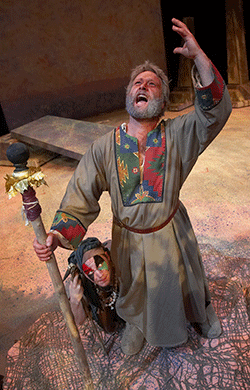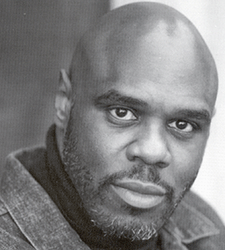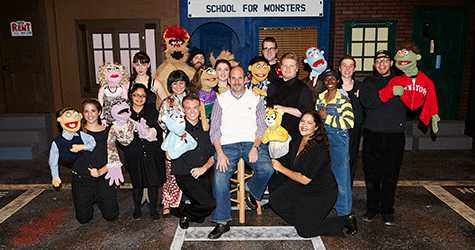Geoff Gehman, July 28, 2015
Ebony Hardin ’09 came to NCC as a singing, dancing actor. She left as a global citizen, on and off the stage.
Hardin’s confidence and vision were boosted by a speech class, a 20-play survey of theater, and a pair of very different productions. She played Condoleezza Rice, the nation’s first African American secretary of state, in a stage documentary about the Bush administration’s involvement in the Iraq War.

She helped create a performance pool for a free-wheeling adaptation of Greek myths. Weekend monologue sessions with a notoriously challenging, but encouraging retired professor helped her enter a prestigious four-year acting program, where she discovered she wanted to do more than act for a living.
Today, Hardin is a casting assistant for popular TV shows (“Graceland”) and movies (the upcoming “War Machine” with Brad Pitt). She is one of countless NCC theatre students elevated by the program’s unique blend of practical, transcendental elements: animal exercises and improvisations with yard-sale props, bold updates of classics and Broadway musicals with bold messages. Some graduates have become professional actors, directors and teachers; most consider theater a laboratory for testing their place in the universe.
“Our goal is to stretch your talent, to get you out of your comfort zone without failing,” says Bill Mutimer, director of theatre and a veteran director of musicals. “We want to help you find your niche. Not what you think you can do, but what you can really do.”
The evolution of NCC’s theatre program to life academy began in 1973 with the arrival of teacher Norman Roberts, a graduate of the Army, a community college, a master’s program in directing and a 210-acre family dairy farm in his native Illinois. Over the next 35 years Roberts spread his mission to improve the world by “acting, and living, honestly and deeply.” He presented towering dramas (“King Lear”), existential comedies (“Waiting for Godot”) and a gay biblical satire (“The Most Fabulous Story Ever Told”).

Many of his productions rippled with references to contemporary issues, links he called “vectors.” The youthful, familial violence in a 1999 production of “Romeo and Juliet” was intensified to parallel that year’s murder of 12 students at a Colorado high school by two seniors.
“The way to do a play is to make all kinds of connections that you understand and don’t understand,” says Roberts. “Theater ought to poke you where it hurts, poke you where we’re not humble, poke you where egos are inflamed.”
At the same time Roberts developed his concept of a theater company performing with the fearless harmony of a jazz group. He encouraged students to become more spontaneous by imitating animals. He encouraged actors to become closer by biting into hot peppers he grew. He cast Ernestine Sewell ’01, an African American female, as a white, blind male seer in “Oedipus Rex” because he liked her voodoo-priestess gestures and “listening” eyes.
Roberts could be purposefully paradoxical, claiming that “sometimes being scared of something just means you’re looking forward to it.” He could be demanding, insisting that students find their “bitter truth.” And he could be parentally kind. When Sewell was bothered by white students wanting to touch her orange-dyed hair, he calmed her by saying: “Well, Ernie, you’re an exotic pepper plant.”
One of Roberts’ more successful, unusual proteges is Michael Bentt, who came to NCC in 1995 as a retired heavyweight boxing champion seeking to improve himself as a boxing analyst. Roberts quickly placed him on a path toward an acting career. He had Bentt rehearse a Hemingway short story with a European exchange student, play the Gravedigger in “Hamlet,” and internalize the famously tough lessons of Constantin Stanislavski, the fabled acting guru.

After leaving NCC, Bentt found other no-nonsense, nurturing mentors. In 2001 he played his first major character, Sonny Liston, the talented, tragic boxer, in the film “Ali”; he also helped train star Will Smith. Since then he’s served as a boxing commentator/essayist, acted in a wide range of movies (“Public Enemies”) and TV series (“Sons of Anarchy”), directed an Off-Broadway play about a boxer and inspired an opera about a boxer. In 2003 he returned to NCC to perform the title figure in a Roberts-directed “Othello,” a mountain both men needed to climb together.
Bentt thanks Roberts for helping him pursue the “push-pulls of creativity” in all his passions. Boxing, acting and living, he’s come to realize, all involve the “struggle for or with something or someone.”
Roberts retired in 2008, leaving a large legacy, on and off campus. On his watch the number of full-time theatre teachers rose from one to three while the number of theatre majors zoomed from zero to 65. He launched a theatre degree, an acting scholarship fund and admission as canned goods for a food bank. It was his way of feeding the community that feeds the community college.
Seven years later, Roberts’ influency is still felt NCC. Bill Mutimer and Jaye Beetem now co-coordinate the theatre program, booking similarly eclectic, ambitious seasons, mixing plays mystical (“The House of Bernarda Alba”), provocative (“The Colored Museum”) and genre-b(l)ending (a post-apocalyptic, “Mad Max”-style “Macbeth”).

He’s ramped up the schedule by introducing popular, award-winning musicals like “Rent” and “Avenue Q,” both of which address the growing pains of young adults. Musicals are not only Mutimer’s forte as a director; they are a specialty of high-school theater programs in the greater Lehigh Valley, which compete every year in the Freddy Awards, the State Theatre’s Tony-style musical extravaganza. The emphasis on well-known, colorful musicals, plus an annual Freddy scholarship, has helped increase the number of theatre majors to 85.
Like Roberts, Mutimer draws heavily on engaging, expanding exercises. He personalized a production of “Angels in America” by telling stories about witnessing the AIDS crisis in ’80s New York City. He uses yard-sale items–an Abominable Snowman figure, a gun that shoots Nerf balls-to make improvisations easier and harder. One of the keys to good acting, he likes to point out, is opening the door to the imagination by shutting the door to cynicism.
The differences between Mutimer and Roberts are summarized neatly by NCC designer Julie “Jaye” Beetem, who has created sets and lights for both directors. “Norman could really boom and fill the space when he was not getting what he wanted,” says the associate professor of communication/theatre “He is probably one of the last theater teachers who can scare people into good performances. Bill is more laid-back, more low-key. I can remember him yelling just once, when he told a student who had panicked: ‘Quit defeating yourself! The only person standing in your way is you!’ But he doesn’t believe in sugar coating anything.”
Beetem shares Mutimer’s strong sense for common sense. Aspiring directors, she claims, need to learn about stage management. Aspiring designers need to learn to balance safety with ingenuity, persistence with patience. Every student needs to learn that effective theater, like effective life, depends on teammates turning disappointments into happy compromises.
Mutimer and Beetem leaven tough love with love. They view mastery of speech as an acting tool. They love to help theater rookies blossom. A theater degree, they love to remind students, can blossom into a career as a human-relations executive or a drama therapist.
This mission has been taken to DeSales University, which accepts NCC transfers in its highly rated theater, radio and TV programs. To Muhlenberg College, where Mutimer directs musicals and teaches. To NCC’s nursing program, for which Beetem designed a soundtrack for emergency drills-an ideal job for a nurse’s daughter.
NCC’s theatre leaders plan to make the program more prominent. Mutimer wants to bring to campus prominent playwrights like Suzanne-Lori Parks, who won the 2002 Pulitzer Prize for her drama “Topdog/Underdog.” Beetem wants to raise money for the acting scholarship fund by bringing back a prominent teacher. She thinks it would be terrific if Norman Roberts directed his first show in the Norman R. Roberts Lab Theatre.

